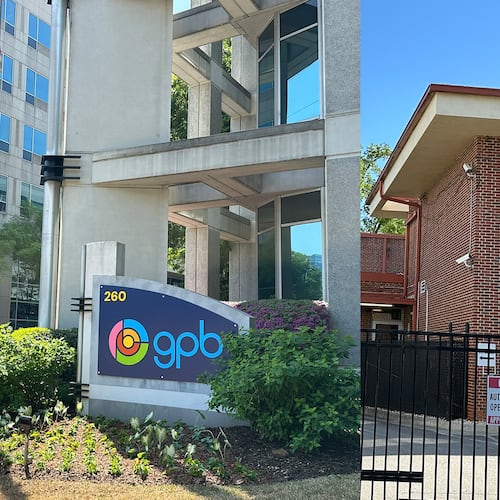Daryl James has always been fascinated by skyscrapers. As a kid, sitting in the backseat of the family van on cross-country road trips, he would marvel at the towers in the cities they drove through. That fascination is part of what led him to start his own company in 2019, EME Construction.
What started as a side hustle doing residential renovations has grown into commercial buildouts for customers like Navy Federal and Family Health Centers of Georgia. But James sees even bigger things in his future.
“I used to draw skylines,” James said. “Now I want to build high-rises.”
But EME Construction is James’ first time being a full-time entrepreneur and, for now, he’s still a one-man band. And there’s a steep learning curve going from his former job as a government auditor to construction CEO. So, James has turned to business support programs run by the Morehouse Innovation and Entrepreneurship Center (MIEC) to learn how to run his company.
“A lot of my success traces directly back to being a part of this cohort,” he said.
Credit: arvin.temkar@ajc.com
Credit: arvin.temkar@ajc.com
James’ experience is not uncommon, according to new research conducted by economics and entrepreneurship professors at Morehouse College and the University of New Orleans. The study found business clinics like the ones James has participated in can boost entrepreneurial outcomes for minority founders.
These clinics are business training courses that, unlike a masters of business administration, typically last from a few weeks to a few months and focus on technical and experiential learning. From March 2020 to January 2021, the researchers surveyed 341 people in Georgia and Louisiana who participated in business clinics.
They asked them if they had ever attended a business clinic in the past, whether they had started their own business before and about their experiences with self-employment, the gig economy and side hustles. The authors then used a statistical model to analyze the effect of having attended a business clinic on the entrepreneurs’ outcomes and broke it down by race and gender.
“The study suggests that these types of business clinics seem to help in understanding and perhaps overcoming some of the systemic barriers that are there [to entrepreneurship],” said Tiffany Bussey, executive director of the MIEC and one of the study’s co-authors.
Credit: Arvin Temkar/AJC
Credit: Arvin Temkar/AJC
On a recent Tuesday, Bussey was welcoming James and about a dozen other entrepreneurs to a conference room in northwest Atlanta to hear from officials from St. Louis, Missouri-based McCarthy Building Companies, a multi-billion dollar construction firm that helped build the domestic terminal canopy at Hartsfield-Jackson International Airport, about how to do business with them.
The MIEC is currently running a seven-month small business executive program for construction companies. The center’s goal is to open the doors for the 17 participating businesses to secure contracts and capital. To that end, entrepreneurs get one-on-one executive coaching and teams from large contractors like McCarthy, J.E. Dunn, Holder Construction and the supplier diversity division of Hartsfield-Jackson are teaching participants how to work with them.
Bussey’s research suggests that business clinics could be an effective strategy for increasing the supply of underrepresented entrepreneurs, like Chassydi Butts, owner of dump truck and hauling company Go-Ram Logistics. She is a first-time entrepreneur and is part of the MIEC’s construction cohort, which she hopes helps her be able to “bid competitively and bid as a Black minority small business.”
Governments for years have instituted minority-, women- and veteran-owned business requirements into contracting as a way to address income inequality and help grow disadvantaged businesses. Many corporations have enacted similar requirements.
McCarthy officials recently showed the participating entrepreneurs how the company awards bids for subcontracting work, projects that could pay small business owners millions of dollars. And the benefit for McCarthy in participating in this training is that it increases the number of diverse suppliers that the company can tap, said Stephanie Lee, senior director of supply diversity and community outreach for McCarthy.
“My purpose is to make sure that diverse businesses are connected to the opportunities, that they grow… and that we are creating an economic impact for them,” Lee said.
She added that entrepreneurs who go through the MIEC program will likely be given extra consideration by McCarthy, highlighting the networking benefits of these types of clinics.
Credit: arvin.temkar@ajc.com
Credit: arvin.temkar@ajc.com
The study also indicates that one size does not fit all when it comes to entrepreneurial training and considering the individual founder and their historical and cultural contexts matter, Bussey said.
But the study did not measure how likely the programs were to boost minority entrepreneurship and Bussey said there is still a lot that is unknown about business clinics, like how long they need to be to have positive outcomes, what topics should they cover and how should they be structured. She is currently researching some of those issues through a million-dollar grant from JPMorgan Chase.
For James, he participated in one of the MIEC’s programs for new businesses shortly after starting EME Construction. The construction clinic is now the second one he is taking part in because his experience with the first was “so beneficial and helpful.”
He met his accountant and part of his legal team through the clinics and has done work with other members of his cohorts. He said he the programs taught him what it takes to run a construction firm, helped him more than double his revenue and he recently told his cohort about a lunch meeting he had with a larger contractor that led to them asking him to bid on one of their projects.
James recently finished building out a waxing salon in Duluth and is doing demo and framing for a new Grady Health System clinic. He hopes to bring on an employee in the spring.
So maybe one day soon James will be able to look at Atlanta’s skyline and see his own work.
The Atlanta Journal-Constitution and Report for America are partnering to add more journalists to cover topics important to our community. Please help us fund this important work at ajc.com/give
About the Author
Keep Reading
The Latest
Featured



